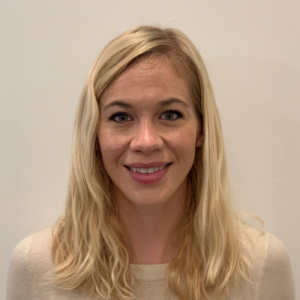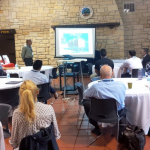 April Janssen is a Sustainability Specialist at ISTC’S Oak Brook Office, where she works with businesses and communities improve their waste management practices.
April Janssen is a Sustainability Specialist at ISTC’S Oak Brook Office, where she works with businesses and communities improve their waste management practices.
How old were you when you first became interested in sustainability? What sparked your interest?
Growing up in Wisconsin on a river, I’ve always had a connection to nature and sustainability. I recall saving my modest childhood allowance to adopt an acre of rainforest through the Nature Conservancy so I could somehow be part of this wonderous ecosystem. Living in Chicago that has manifested to personal actions, studying and professionally pursing sustainability.
Who or what drew you to study sustainability?
While initiating and growing the Chicago Marathon’s Sustainability Program, I began applying my personal practices professionally and acknowledged my passion for topic, as well as the need for a more formal foundation.
What is your background prior to working at ISTC?
I worked on the Chicago Marathon (Chicago Event Management) for 7 years, managing the Volunteer Program and developing the Sustainability Program. As an event invested in health and fitness, the community hosting the 26.2 mile course and the dozens of charities who use the event to raise millions of dollars, an environmental aspect was the next natural step. We utilized the Council for Responsible Sport’s certification as a framework to guide the program and our initiatives, as well as earn certification. I left to pursue a Master’s in Sustainable Urban Development and began working at Bright Beat, a sustainability consultancy, where I was able to gain more experience in sustainable operations, facilities, communication and engagement through a variety of projects.
What are you looking forward to the most in your new role at ISTC?
I am looking forward to supporting and learning more about the many diverse sustainability applications ISTC’s project partners are seeking – from waste characterization studies aimed at achieving zero waste, to renewable energy generation recommendations in support of net zero commitments, and everything in between. I am excited to be here!
What are common misconceptions about your career? OR What question do you get asked most frequently about your career?
The most common misconception is that sustainability is ‘too difficult’ or ‘too costly’, when often small changes make big impacts, at little to no cost, or there’s a cost savings. The most common question I am asked is, ‘Can I recycle this?’
What are some challenges you’ve faced in your career?
People who don’t care. I take the carrot rather than the stick approach, ultimately educating, inspiring, and enticing people to care.
What advice would you give to future sustainability professionals?
Stick with it! There are many approaches to sustainability and paths to where you want to be.
If you could switch jobs with someone, who would it be?
I would love to work on the sustainability program of an Olympic Games. Years in the making, the world stage, excellence in sport, a time of peace and camaraderie – the Olympics exemplify the best humanity has to offer.


 Lisa Krause recently joined ISTC as a coastal management specialist working with the Illinois Department of Natural Resources (IDNR)
Lisa Krause recently joined ISTC as a coastal management specialist working with the Illinois Department of Natural Resources (IDNR)  On October 3, participants from seven different food manufacturing companies gathered at Thatcher Woods Pavilion in River Forest to learn how to take sustainability to the next level at a workshop sponsored by ISTC’s Technical Assistance Program, the Forest Preserves of Cook County, ComEd, Peoples Gas, and North Shore Gas.
On October 3, participants from seven different food manufacturing companies gathered at Thatcher Woods Pavilion in River Forest to learn how to take sustainability to the next level at a workshop sponsored by ISTC’s Technical Assistance Program, the Forest Preserves of Cook County, ComEd, Peoples Gas, and North Shore Gas.